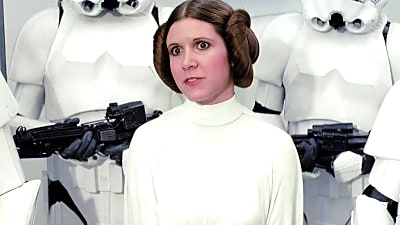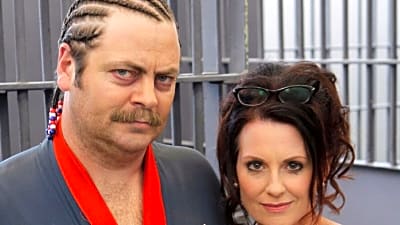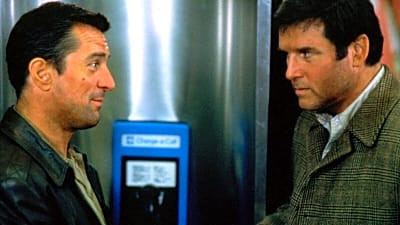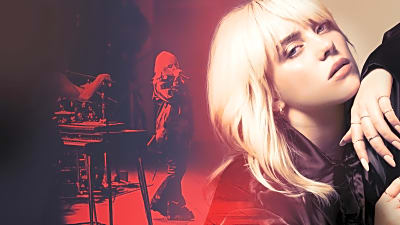- Home
- Quizzes
- My Quiz Activity
- Newsletters
- MY FAVORITES
- Add Sports/Teams
- SPORTS
-
NFL
- NFL Home
- Arizona Cardinals
- Atlanta Falcons
- Baltimore Ravens
- Buffalo Bills
- Carolina Panthers
- Chicago Bears
- Cincinnati Bengals
- Cleveland Browns
- Dallas Cowboys
- Denver Broncos
- Detroit Lions
- Green Bay Packers
- Houston Texans
- Indianapolis Colts
- Jacksonville Jaguars
- Kansas City Chiefs
- Las Vegas Raiders
- Los Angeles Chargers
- Los Angeles Rams
- Miami Dolphins
- Minnesota Vikings
- New England Patriots
- New Orleans Saints
- New York Jets
- New York Giants
- Philadelphia Eagles
- Pittsburgh Steelers
- San Francisco 49ers
- Seattle Seahawks
- Tampa Bay Buccaneers
- Tennessee Titans
- Washington Commanders
-
MLB
- MLB Home
- Athletics
- Arizona Diamondbacks
- Atlanta Braves
- Baltimore Orioles
- Boston Red Sox
- Chicago White Sox
- Chicago Cubs
- Cincinnati Reds
- Cleveland Guardians
- Colorado Rockies
- Detroit Tigers
- Houston Astros
- Kansas City Royals
- Los Angeles Angels
- Los Angeles Dodgers
- Miami Marlins
- Milwaukee Brewers
- Minnesota Twins
- New York Yankees
- New York Mets
- Philadelphia Phillies
- Pittsburgh Pirates
- San Diego Padres
- San Francisco Giants
- Seattle Mariners
- St. Louis Cardinals
- Tampa Bay Rays
- Texas Rangers
- Toronto Blue Jays
- Washington Nationals
-
NBA
- NBA Home
- Atlanta Hawks
- Boston Celtics
- Brooklyn Nets
- Charlotte Hornets
- Chicago Bulls
- Cleveland Cavaliers
- Dallas Mavericks
- Denver Nuggets
- Detroit Pistons
- Golden State Warriors
- Houston Rockets
- Indiana Pacers
- Los Angeles Clippers
- Los Angeles Lakers
- Memphis Grizzlies
- Miami Heat
- Milwaukee Bucks
- Minnesota Timberwolves
- New Orleans Pelicans
- New York Knicks
- Oklahoma City Thunder
- Orlando Magic
- Philadelphia 76ers
- Phoenix Suns
- Portland Trail Blazers
- Sacramento Kings
- San Antonio Spurs
- Toronto Raptors
- Utah Jazz
- Washington Wizards
-
NHL
- NHL Home
- Anaheim Ducks
- Boston Bruins
- Buffalo Sabres
- Calgary Flames
- Carolina Hurricanes
- Chicago Blackhawks
- Colorado Avalanche
- Columbus Blue Jackets
- Dallas Stars
- Detroit Red Wings
- Edmonton Oilers
- Florida Panthers
- Los Angeles Kings
- Minnesota Wild
- Montreal Canadiens
- Nashville Predators
- New Jersey Devils
- New York Islanders
- New York Rangers
- Ottawa Senators
- Philadelphia Flyers
- Pittsburgh Penguins
- San Jose Sharks
- Seattle Kraken
- St. Louis Blues
- Tampa Bay Lightning
- Toronto Maple Leafs
- Utah Mammoth
- Vancouver Canucks
- Vegas Golden Knights
- Washington Capitals
- Winnipeg Jets
- NCAAF
- NCAAM
- Olympics
- Boxing
- Entertainment
- Lifestyle
- Golf
- MMA
- Soccer
- Tennis
- Wrestling
- Sports Betting
- More Sports
- RESOURCES
- My Account
- YB on Facebook
- YB on Twitter
- YB on Flipboard
- Contact Us
- Privacy Policy
- Terms of Service

The music that blew us away in 2017
In 2017 we wanted our music loud, provocative and unflinchingly honest about the world as protest songs, declarations and comebacks ruled our playlists this year. From Kendrick Lamar, Kesha, SZA, Migos to St. Vincent, the personal was political – and we couldn't get enough of it.
Kendrick Lamar - "Fear" (Single)

This track is to Ta-Nehisi Coates's "Between the World and Me" what Woody Guthrie's "Tom Joad" is to John Steinbeck's "The Grapes of Wrath" – the condensation of a classic book's central thesis into a song. If Bob Dylan can win the Nobel Prize for literature, then the Norwegian Nobel Committee should be giving K-Dot his any year now.
Downtown Boys - "Cost of Living" (Album)

We live in political times – an observation everyone, regardless of political philosophy, can agree on. "Cost of Living," Downtown Boys first album under the legendary Sub Pop banner, is the soundtrack for The Resistance. The album tackles subjects like income inequality and racial injustice over 12 punk tracks.
Vince Staples - "Big Fish Theory" (Album)

Vince Staples isn't just the future of rap, he's the future of music. He made that perfectly clear with the release of "Big Fish Theory," his sophomore follow-up to the critically acclaimed "Summertime '06." "Big Fish Theory" has so many fantastic songs, "Yeah Right," which features an MVP level verse from Kendrick Lamar, isn't even the best one.
Bad Bunny featuring J Balvin, Ozuna & Arcangel - "'Soy Peor' Remix" (Single)

If you don't know who Bad Bunny is, you soon will. The Puerto Rican Latin trap star is one of the biggest acts in the Latin urban genre, and the dude hasn't even released an album. Don't be surprised if a big name artist – cough Drake cough – tries to pull a "Despacito" with Bad Bunny. The "Soy Peor" remix, released in June, needs to be on every one of your playlists moving forward.
Rostam - "Half Light" (Album)

Rostam Batmanglij's post-Vampire Weekend career has been nothing short of fantastic. Last year's "I Had A Dream That You Were Mine" was one of the most underrated albums of 2016. "Half Light" is even better. To call it ethereal would be a cliche, but it really is the most appropriate descriptor for this album. For proof, listen to "Wood."
SZA - "The Weekend" (Single)

Kendrick Lamar may be Top Dawg Entertainment's biggest artist, but SZA isn't too far behind. Her debut album "Ctrl" will surely make a lot of end of the year's lists because of songs like "The Weekend," a realistic assessment of dating in the modern era set to a sultry backdrop.
Gorillaz feat. Vince Staples - "Ascension" (Single)

"The sky's falling, baby/ Drop that ass 'fore it crash" might be the most clever lyrical reference to Chicken Little ever. Easily the best track on "Humanz," "Ascension" is the Gorillaz at their collaborative best. The band creates a musical playground for Vince Staples's mastery of language to go wild.
The War on Drugs - "A Deeper Understanding" (Album)

Adam Granduciel of The War on Drugs has been drawing comparisons to Bruce Springsteen for quite some time now. "A Deeper Understanding" is Granduciel at his Bossiest. "Thinking of a Place" – one of many standouts on this album – sounds and feels like what Bruce Springsteen's "I'm On Fire" would be like if it were ten minutes long.
Sampha - "(No One Knows Me) Like the Piano" (Single)
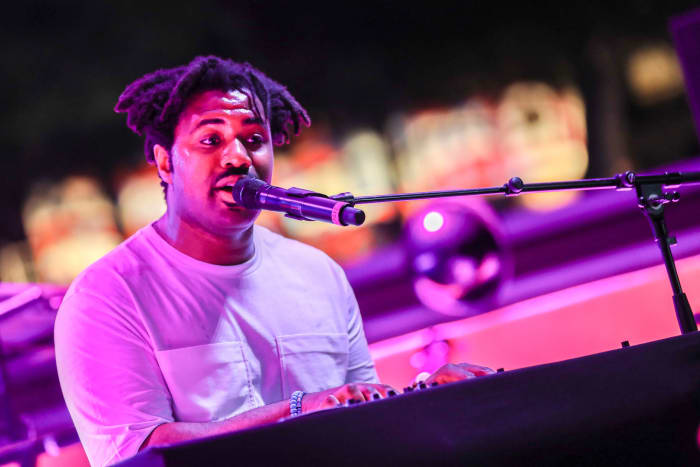
Sampha's "(No One Knows Me) Like the Piano" feels like home because it really is about the home he grew up in. The sincerity of this track, partially a loving tribute to a mother lost to cancer, is capable of touching even the most impenetrable of hearts.
LCD Soundsystem - "American Dream" (Album)

When a legendary band announces they're reuniting, it's difficult not to be a cynic and think that it's nothing more than a cash grab. That wasn't the case with LCD Soundsystem. It turns out that the band every person who graduated college from 2002 until 2009 loves still had at least one more good record in them. "American Dream" is not only on par with "Sound of Silver" and "This is Happening," it might be better.
Kendrick Lamar - "Damn." (Album)

"To Pimp a Butterfly," Kendrick Lamar’s first full-fledged masterpiece, was an exploration of the historical moment – #BlackLivesMatter, and the fading of the Barack Obama era. "Damn." is Kendrick’s rumination on his own place in that history. It’s a loosely autobiographical journey, like 2012’s "Good Kid, M.A.A.D. City," where Lamar considers the ambiguities and contradictions of art and hip-hop; it’s stripped-down, dense, allusive, and enthralling.
Sheer Mag - "Need To Feel Your Love" (Album)

Philadelphia rock quintet Sheer Mag built an underground following with a series of lo-fi EPs that blurred the lines between punk, classic rock, and ’80s metal – it’s like 41 minutes of the Replacements’ version of “Black Diamond,” by Kiss. The band’s debut offers a slicker sound and refined songwriting, but it’s still a punch right in the face.
Ibeyi - "Ash" (Album)

The twin sisters Lisa-Kaindé and Naomi Diaz translate their cosmopolitan roots (Cuba, France, Venezuela) into gorgeous, jazzy art pop as Ibeyi. The duo’s second album is more joyful than their 2015 debut, which paid tribute to their late father and older sister; "Ash" mixes contemporary electronic beats with rich, ornate vocal harmonies, jazz (Kamasi Washington has a guest spot), and traditional Nigerian musical instruments.
Susanne Sundfør - "Music for People in Trouble" (Album)

Two albums of soaring Scandinavian electro-pop in 2010 and 2015 helped raise Norwegian singer/songwriter Susanne Sundfør’s international profile; she returns to her folk roots on "Music for People in Trouble," an intimate, almost entirely acoustic album that nevertheless soars just as high as its predecessors.
Ex Eye - "Ex Eye" (Album)

This unexpected collaboration between Arcade Fire sideman/progressive jazz saxophonist Colin Stetson and underground stalwarts Greg Fox, Shahzad Ismaily, and Toby Summerfield treads a fine line – intelligent progressive rock, heartfelt jazz fusion, brain-bending experimental metal, all served up with insistent, lower-body-shaking rhythms and irresistible hooks.
Lee Ann Womack - "The Lonely, the Lonesome, and the Gone" (Album)

Lee Ann Womack’s commercial success might have peaked with "I Hope You Dance," way back in 2000. But she’s been on a creative streak for more than a decade, with a series of grown-up traditional country albums that have been largely ignored by radio. The latest is maybe the best, a moody, bluesy, world-weary collection that recalls both Patsy Cline and Dusty Springfield.
Fever Ray - "Plunge" (Album)

2009’s Fever Ray felt like an experimental extension of Swedish electronic-pop singer-producer Karin Elisabeth Dreijer’s previous project, the Knife. The long-awaited follow-up is a bold step forward, an accessible, even catchy, meditation on sex, gender, philosophy, and politics. A deep listen, as fun as it is smart.
Miguel - “Pineapple Skies” (Album)

Miguel’s first two singles of 2017, “Sky Walker” and “Shockandawe,” suggested that he was still intent on stretching the boundaries of modern R&B. His third, “Told You So,” was a winning but familiar Prince-inspired guitar jam. “Pineapple Skies” is the best of both approaches – an adventurous slice of slinky mid-paced funk that feels futuristic and timeless.
Elder - "Reflections of a Floating World" (Album)

This Boston trio’s fourth album is a slow-burning stoner-rock classic-to-be – ambitious and majestic, full of a searching, cosmic grandeur that’s built on crushing, intricate guitar riffs and scorching solos. Elder fully realizes the potential for hard rock to be heavy and beautiful at the same time.
Migos - "Culture" (Album)

Atlanta’s platinum trap trio nailed their follow-up to 2015’s lackluster "Yung Rich Nation" – the weird exuberance of “Bad and Boujee” and the druggy atmosphere of “T-Shirt” fulfill the promise of early singles “Versace” and “Hannah Montana,” and "Culture" goes on from there, with the perky, quirky “Get Right Witcha” and the autobiographical psychedelic gangsta epic “Kelly Price.”
CID RIM - "Material" (Album)

Drummer Clemens Bacher has been honing his production teeth by cutting remixes for the likes of The 1975, but his solo project is something absolutely out of this world. Although synths are the primary focus here, he uses them to craft atmospheric funk-scapes, underground club bangers, IDM tributes played with live instruments, and so much more. His mastery of melody and production makes this record an immediate must-listen.
Kesha - "Rainbow" (Album)

There are comeback stories and then there are triumphs. While Kesha’s extremely public difficulties prevented her from making music for years, her triumphant return, wherein she didn’t wallow in her sorrows so much as she liberated herself with joyous pop numbers like the profanity-laced empowerment anthem “Woman” and multiple Avril Lavigne-styled power pop collaborations with Eagles of Death Metal. By the time she gets to her duet with Dolly Parton – redoing a song her mom wrote for Parton back in the ‘80s – it’s okay if you’re feeling a little misty-eyed: Kesha’s triumph isn’t so much this album as much as it is all the music she’s going to make after this.
Run The Jewels - "Run the Jewels 3" (Album)

El-P and Killer Mike are now in the running for the greatest rap duo of all time, as they fit in the same lineage of Eric B. and Rakim or OutKast. Yet after exploring the dark depths of police brutality in “Run the Jewels 2,” here, the guys get just a little bit more accessible, adding a slight pop touch to El-P’s “Blade Runner”-beats and tossing out punchlines like confetti. It’s at times emotional, at times brutal, and at times gut-busting. How crazy is it that they wrap up their first trilogy of albums by releasing their best one?
Jens Lekman - "Life Will See You Now" (Album)

For awhile, it looked like we lost our favorite Swedish quirk-pop songwriter. 2012’s “I Know What Love Isn’t” was stripped down and musically simple, a sharp contrast to the sample-based, any-genre-goes brand of 70s-indebted game show pop. Yet, “Life Will See You Now” is an absolute return to form, mixing modern synth beats with ukeleles, tablas with Paul Simon-styled worldpop guitar workouts, and with lead single “What’s That Perfume You Wear?” island-flavor rumbas that wouldn’t sound out of place on American Top 40 radio. He’s back, baby, and not a moment too soon.
White Sea - "Tropical Odds" (Album)

Having previously written some indie-electronic jams with M83, Morgan Kibby’s turn towards the solo mixed ‘80s-inspired dance beats with stoned, sometimes absolutely otherworldy lyrics delivered with a diva’s punch. “Tropical Odds” is a quieter, glass-of-wine-in-hand-as-you-stare-at-an-overcast-sky kind of affair, but it’s no less impactful, those swirling synth cellos and light touches of reverb grounding her consciously-baked brand of mid-tempo dance-pop. It’s a gorgeous affair, and one we’ll be revisiting time and time again.
Spoon - "Hot Thoughts" (Album

Every once in awhile, Austin's minimalist indie rock champions decide “You know what? We haven’t dropped a classic album in a spell – we should do that again.” Rubbing shoulders with must-owns like “Kill the Moonlight” and “Ga Ga Ga Ga Ga,” “Hot Thoughts” adds some synthesizers into the band’s sonic palette, and they hit the ground running with it, with the album’s title track hitting that catchy-guitar-line sweet spot time and time again, while “Shotgun” may be one of the most propulsive little numbers they’ve yet penned, sinewy basslines mixing with Britt Daniel’s acid-tainted lyrics. It’s an end-to-end burner in the best of ways.
Broken Social Scene - "Hug of Thunder" (Album)

Canada’s favorite too-many-membered indie rock collective haven’t released an album since 2010’s underappreciated pop-leaning effort “Forgiveness Rock Record,” so when the group got back together with old friends (like Feist) and new members in tow, they went out to make a glorious career overview of an album, hitting the feelings of all their diverse albums and rolling them into sweet amalgams, getting furiously weird with “Vanity Pail Kids,” self-consciously goofy with “Protest Song,” and even a bit hopeful on “Gonna Get Better.” Them being back is assuring in its own way, and makes us wish they’ll stick around just a bit longer.
Nite Jewel - "Real High" (Album)

For her fourth album of blissed out, chill synth pop, Ramona Gonzalez kept things simple and lo-fi. There’s scratches and fuzz to the recordings presented here, but it only adds to the basement-universe vibes that she manages to create here, her voice echoing out as ice-cold synths dance around her and try to understand what the warmth of a human is. Perfect for nights when you’re driving around with the sunroof off.
Niteshifters - "Hard Disco" (Album)

There’s a point when a band just becomes so good at what they do that they transcend the very style they’ve been trying to imitate. For the London-based Niteshifters, this group wants to do classic disco funk so accurately that instead of coming off as mere imitation, the end result here is something resembling the real thing, with songs like “Move Those Dancing Feet” rife with trumpet solos that never feel too indulgent, adding that right amount of spice to your mirrorball boogie. It’s not to be taken seriously, and therein lies the charm: so much effort went into an album so disarmingly fun that we’re ready to put it on repeat the second it’s over.
Tyler the Creator - "Flower Boy" (Album)

While so much was made over the controversy of this album being a low-key declaration of infamous misogynist and homophobe Tyler the Creator coming out as gay, those who focused on that aspect missed what this album was truly about: sadness. Loneliness. Of thinking you have friends up until the exact moment that you actually need them. In many ways, Tyler’s album – self-produced just like his others – is almost trying to be a party to distract himself, but he can’t shake the cobwebs hiding underneath it, as even the aggressive numbers like “Who Dat Boy” and “I Ain’t Got Time!” hide a veil of sadness. It’s an immaculately constructed world, but one that seems just for Tyler. Join him, won’t you?
Shugo Tokumaru - "TOSS" (Album)

What the living hell even is this thing. Produced within an inch of its life, the saying of putting “everything and the kitchen sink” into an album has never been more applicable here. Any given 10-second sample of time on “Toss” sounds like at least 20 different instruments trying to fight for attention, and the next 10-second sample you pull will have two dozen more instruments you haven’t heard. “Lift” takes a simple guitar riff and adds in full-bore Aaron Copland string sections and ‘60s drum kits, while “Cheese Eye” is the soundtrack to an Warner Brothers cartoon that doesn’t exist. It’s a headspin of a record, but one that makes you want to come back to see what you missed time and time again (and boy will you miss some things).
Kendrick Lamar - “The Heart Part 4” (Single)

Kung Fu Kenny probably has the best hip hop album of the year and has an off-shot for album of the year with “Damn.” However, Kendrick Lamar put the whole game on notice with the track he dropped just weeks before “Damn.” when he let the world hear “The Heart Part 4” – a tone-setting track where he took shots at everyone. While their names weren’t dropped, Kendrick ostensibly had a few bars for both Big Sean and Drake. The Heart Part 4 never ended up on “Damn.,” but it helped define Kendrick’s 2017 just as much as the album did.
Thundercat - “Drunk” (Album)

The sheer randomness of every single track on “Drunk” is what makes Thundercat’s third studio album such a fun listen. “Drunk” is a gumbo of funk, soul, rock and psychedelia that is built around Thundercat’s bass and voice. Kendrick Lamar, Michael McDonald, Kenny Loggins, Wiz Khalifa and Pharrell all make appearances on “Drunk,” and all contributions help bring this album to life. “Them Changes” is peak Thundercat and features an absolutely addictive bass riff. With “Drunk,” you should come for the thoughts on how cool it must be to be a cat, but stay for the political commentary on police brutality and everything in between.
Sunni Colon - “Little Things” (Single)

“Little Things” is one of those songs that couldn’t exist without the voice (Colon) and the production (Kaytranada). The versatile track will feel as natural at your summertime rooftop party as it would in your local coffee shop. Kaytranada’s funky production puts the song in motion, but Colon’s voice singing about a love beyond the surface is just a flat-out excellent listen. This mid-tempo jam is just the kind of little thing that Colon feels that we should appreciate in life. It’s meta, but it’s perfect.
Snoh Aalegra - “Feels” (Album)

Snoh’s first introduction to the mainstream music world happened when she was sampled on Drake’s “Do Not Disturb.” It’s not the most natural route singers take to start turning heads, but with “Feels” Snoh has officially arrived with a 13-track album with no songs you need to skip over. "Feels" is emotionally vulnerable, brilliantly produced and what she describes as cinematically soulful. “Feels’” central theme revolves around the idea that one needs space and time to heal and move on, and the haunting production combined with atmospheric feel to her vocals accomplishes just that.
Frank Ocean - “Biking” (Single)

Frank Ocean’s “Biking” feels like a bridging of the gap between yesterday’s hypermasculinity and the intense vulnerability of today’s hip hop artists. Jay-Z, who served as an aspirational totem of how a rapper should conduct himself, is featured on the track with Tyler, The Creator – both of whom dropped incredibly personal albums in 2017. Ocean brings them together on "Biking," a song that is essentially the tension between what you want and what life is willing to give you that everyone goes through no matter your socioeconomic status, race, religion or sexual orientation. The reliability of the song is only exasperated by Ocean’s unbridled emotion at the end of the track
Freddie Gibbs - “You Only Live Twice” (Album)

“You Only Live Twice” is an efficient, eight-track, 30-minute album that sees Gibbs reflect on the legal issues that found himself in jail for weeks in Austria for allegedly sexually assaulting two women while on tour overseas. In the short album, Gibbs glosses over the case, how his fiancé kept him sane by flying overseas to bring him some non-German books and how much he missed his daughter throughout the whole ordeal. “24 Karat Jesus” is peek Gibbs, a 5:22 track that sounds like his early work in the first half, and after a beat switch up to a smooth soul sample, Gibbs shows off his versatility. Freddie Gibbs is one of the more underappreciated rappers of our era. Insanely talented and insightful at his best, Freddie Gibbs recognizes his flaws as a human but remains true to who he is and his background at the same time.
Grizzly Bear - “Painted Ruins” (Album)

The best part of “Painted Ruins” is that you discover something new about the album each time you give it a spin. Listing to Grizzly Bear is always like a road trip through the Pacific Northwest. It always feels cold, but not freezing. It’s beautiful, but the aesthetics aren’t all encompassing. Without the lyrics, “Painted Ruins” is worth the 48 minutes, but the words bring you closer to the sounds. “Painted Ruins” is pretty synth-heavy for a Grizzly Bear album, but the experience derived from the music is as enjoyable for the listener as ever.
Moses Sumney - “Aromanticism” (Album)
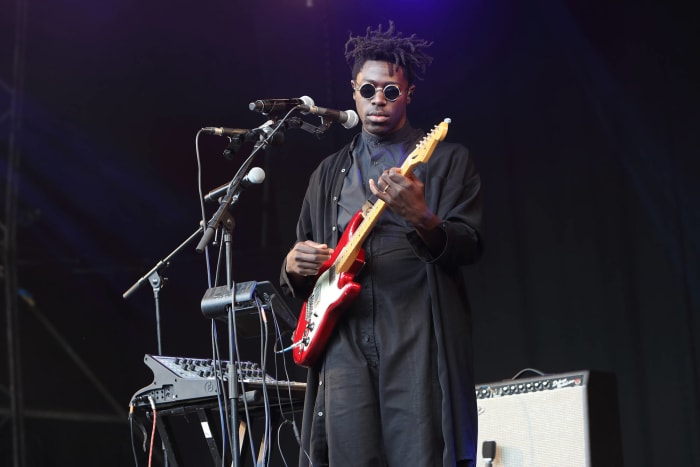
“Aromanticism” is an album all about rejecting the idea of coupled, romantic love despite feeling like everything you’d want coupled, romantic love to feel like. There is so much warmth for an album about being lonely, so much light from an album so dark. "Aromanticism" is airy in all of the right ways with moments that will leave you feel like you’re drowning in Summey’s voice. Maybe the cold months aren’t the best time of year for this album, because if you spend them alone, you could be left asking, “If my heart is idle? Am I doomed?” just like Moses Sumney.
Gabriel Garzon-Montano - “Jardin” (Album)

Gabriel Garzon-Montano had one of the easiest voices to listen to in 2017 and “Jardin” is one of the smoothest albums of the year. Montano has a deep musical background, which led to him writing or co-writing every song on the album with him playing at least one instrument on every track, too. If nothing else, “Jardin” is his album, but it belongs to the music of myriad eras. There is ‘50s bebop, ‘60s soul and ‘90s RnB influences all over this album, and Montano’s voice is what ties everything together.
Rick Ross - “Rather You Than Me” (Album)

No rapper has a better ear for beats than Rick Ross. Even if his lyrics added nothing to the conversation, you could pop in any Ross album and get inspired by the production, and this remains true on “Rather You Than Me.” “Dead Presidents” featuring Future, Jeezy and Yo Gotti is a the kind of anthemic track that put Ross on the map while “Trap, Trap, Trap” featuring Young Thug and Wale carries on his tradition of adding the flavor of South Florida to Atlanta’s trap music. “Idols Become Rivals” is a nearly six-minute shot at Cash Money’s Baby while “Triple Platinum” is a shot at the rest of the game letting everyone know that he and the rest of the Maybach Music Group are here to stay. “Rather You Than Me” might be Ross’ most complete album to date.
Lana Del Rey - “Lust for Life” (Album)

'”Lust for Life” is Lana Del Rey becoming a real person. Here, instead of pantomiming a torch song chanteuse, she opens herself up in a way few performers are able to accomplish in a social media world. Her music remains lush, but feels fresher than ever. 70-plus minutes of her best work to date.
Orchestral Manoeuvres in the Dark - “The Punishment of Luxury” (Album)

There is no reason that a kitch act formed in 1978 should sound this vital in 2017, but Orchestral Manoeuvers in the Dark – a band known mostly for it's one-hit wonder “If You Leave,” from the “Pretty in Pink” soundtrack – pulls off an album alive with the electricity of a group formed in the 21st century. Of particular note is their six-minute opus “Ghost Star,” a track that proves electronica still matters.
Gorillaz - “Humanz” (Album)

Sometimes it feels like Damon Albarn loves his collaborations with his pseudo band Gorillaz more than his work with his own real-life band, Blur. Albarn and Jamie Hewlett give listeners a dark electronica landscape featuring an eclectic mix of performers, including Pusha T, Mavis Staples, and Grace Jones. "Humanz" feels like an art exhibition that is more joyride than pretentious fluff.
Beck - “Colors” (Album)

Beck's 13th studio album “Colors” is a self-contained party. It's the coolest kid in the room who wasn't always that, but now… that coolness is infectious. While a number of the cuts have been released in one form or another (“Wow” in particular found exposure in a car commercial) over the last couple years, together, as a full album, it's alt-rock for a more free-wheeling generation.
Jay-Z - “4:44” (Album)

On it's surface, Jay-Z's “4:44” is seen as an answer to wife Beyonce's “Lemonade,” and in many areas, it is, but it's also something far greater, giving us a version of Hova that is more focused, more mature, and more powerful than ever. By far, the best cut on the album is “The Story of O.J.” an uber-conscious anthem that I honestly never thought could come from Jay at this point in his career, and it's certainly one not expected from someone who cashed in heavily on an American Dream that never wanted him, but that's exactly what makes it, and the album so vital.
St. Vincent - “Masseduction” (Album)

“Masseduction” features a crossroads of tender, subtle vocals with a sonic landscape that pushes and pulls with a fluidity that is as irresistible as it is urgent. In the cut “New York,” St. Vincent is every significant other you've ever loved and struggled not to lose, but the increased tenderness of her vocal performances, coupled with the thematic emphasis on the push and pull of romantic relationships, gives us balance against St. Vincent's usual cultural snark, while still being addictively listenable.
Depeche Mode - “Spirit” (Album)

More politically charged than their usual emo fare, Depeche Mode's “Spirit” is a return to form for a band that wants to stretch its electronic legs. Fortunately, the album does this to great success. “Going Backwards” and "Where's the Revolution" feel like working class anthems modernized from Thatcher-era politics, while “Poison Heart” is soul dunked in electronica acid and served up fresh. Great music from a still-great band comfortable in their own skin.
Flaming Lips - “Oczy Mlody” (Album)

Whatever Wayne Coyne is on, I want all of it. “Oczy Mlody” is probably the closest we can get to going on a weekend bender without popping a single pill. One part drug haze, one part intergalactic pleasure cruise, it might be easy to dismiss The Flaming Lips' latest, but when it comes to mind-blowing music, this is exactly what we're talking about. This is an album that, like some of Frank Zappa's best offerings, must be listened to in one sitting each time it's played.
David Bowie - “No Plan” (EP)

This is it, the last bit of music from David Bowie, released one year after his sudden passing. And while “No Plan” has only four songs (one of which, “Lazarus,” appeared in an earlier form on his final full-length album “Blackstar”), it packs a punch as a final rage against and later a full embrace of impending death. “No Plan” is a sonic thinkpiece on mortality and in that, Bowie feels like he's transcended into a ferryman ready to calm those who follow him across the River Styx.
More must-reads:
- The 20 most-viewed TV series finales
- Watch the final trailer for Ari Aster's 'Eddington' starring Joaquin Phoenix and Pedro Pascal
Breaking News
Trending in Entertainment
Customize Your Newsletter
 +
+
Get the latest news and rumors, customized to your favorite sports and teams. Emailed daily. Always free!
PRIVACY POLICY EDITORIAL POLICY CONTACT US
ABOUT YARDBARKER TERMS OF SERVICE
Use of this website (including any and all parts and
components) constitutes your acceptance of these
Terms of Service and Privacy Policy.
This site is for entertainment purposes only.
There is no gambling offered on this site.
Gambling Problem? Call 1-800-Gambler.


